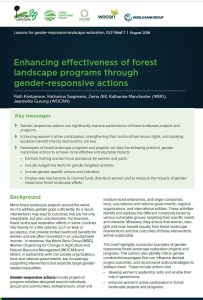Resource information
Many forest landscape projects around the world do not address gender gaps sufficiently. As a result, interventions may lead to outcomes that are not only inequitable, but also unsustainable. In response, the World Bank Group (WBG), Women Organizing for Change in Agriculture and Natural Resource Management (WOCAN) and others, in partnership with civil society organizations, local and national governments, are increasingly supporting interventions that explicitly target gender-related inequalities. The brief highlights successful examples of gender-responsive forest landscape restoration projects and programs. The authors also identify critical gender constraints/issues/gaps that can influence desired project outcomes, and recommend actions/strategies to address them.


